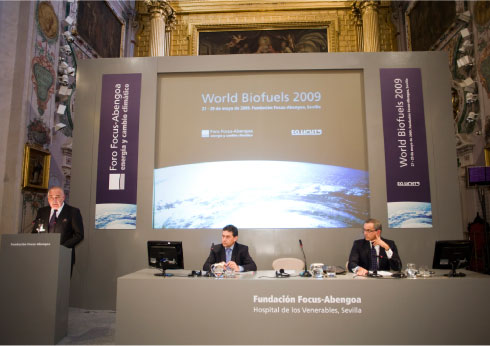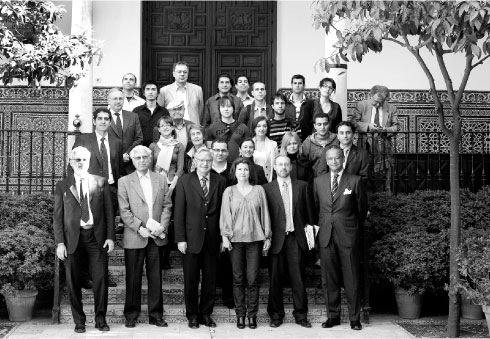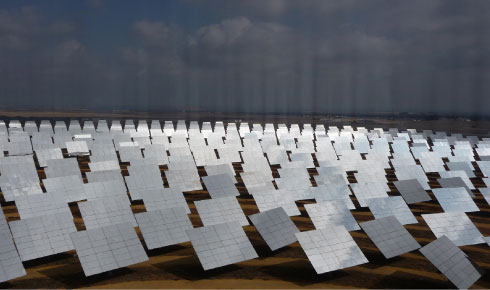 Abengoa
Abengoa
Annual Report 2009
- Corporate Social Responsibility Report
- Abengoa and the Community
- Training, Research and Dissemination
Fully aware of the importance of educating today’s generations for future society, the foundation creates and promotes a variety of programs to promote quality training and education for everyone.
Training Program for the Disabled
For the third consecutive year, Abengoa, in conjunction with the Employment Council of the Andalusian Regional Government and the Safa Foundation, implemented the training program for the disabled.
This administrative secretarial course, funded almost entirely by the European Social Fund, includes a commitment to hire at least 60% of those who complete the program successfully, and these individuals will receive temporary contracts of at least six months upon completing the course. The program comprises 310 class hours and 24 paid internship days.
In addition, agreements have been established with the main organizations and bodies catering to the disabled in order to stimulate job creation and enable the disabled to access and integrate themselves into the labor market. The main lines of action include, among others, recruiting candidates for the different courses, announcing training opportunities, sponsoring promotional activities targeting the disabled, and intermediation in helping to fill vacancies.
Furthermore, over the course of 2009, Focus-Abengoa worked with the Human Resource Research and Development Group of the University of Seville in drawing up the Inserta Project, the aim of which is to enhance opportunities for work placement and integration of the disabled through specific recommendations and best practices of employer organizations.
The Focus-Abengoa Scholarship Program
In 2009, a total of 575 scholarship recipients took part in the Focus-Abengoa Scholarship Program, funded through the educational cooperation agreements that the foundation has undertaken with a variety of national and international academic institutions. In 2009, nineteen institutions were added to last year’s figure of 97, for a total of 134 agreements. Sixty percent of the scholarship holders successfully completed their internships and have joined Abengoa’s team of employees in 2009.
The foundation added the “U.S. Scholarship program” in 2009. This program gave five students the chance to supplement their training through work internships carried out at some of our companies located in the U.S. and Canada.
The cost of the 2009 Abengoa scholarship program totaled 1.023 M€.
Vuela Program for Children of Abengoa employees
The Vuela Program began in 2008 with the aim of giving the children of company employees the chance to gain first-hand knowledge of the company where their parents work, while affording them initial work experience and the opportunity to get to know a different country and culture.
In 2009, fifteen Vuela program grants were awarded in the winter and summer groups.
Sixth edition of the School of the Baroque
Last November, the Focus-Abengoa Foundation, in collaboration with the Menéndez Pelayo International University (UIMP), inaugurated the sixth edition of the School of the Baroque, which, under the heading “Communication and the Baroque”, was held at the Hospital de los Venerables, in Seville, the home of the foundation’s headquarters, under the direction of Roger Chartier, director of studies at the École des Hautes Études en Sciences Sociales in Paris.
The theme of this edition of the School of the Baroque centered on both the ‘servile’ aspect of Baroque journalism as well as its condition as a potential stage for critical public debate; in both its first sensationalist manifestations as well as others closer to today’s concept of ‘serious’ journalism.
Forum on Energy and Climate Change
Abengoa strives to contribute, through the Focus-Abengoa Foundation, to the debate on changing the energy model. And it seeks to do so through a multidisciplinary approach focusing on both technological and economic conditioning factors involving the utilization of clean energy sources, as well as institutional and political mechanisms that encourage or compel users and producers to make decisions compatible with a sustainable energy model.
The aim of this forum is to promote, through public debate, a genuinely open platform for research, presentation and contrasting of ideas and results through whatever actions are deemed relevant at a given time according to the nature of the issues to be analyzed. The goal is for the debate to be far-reaching and flexible enough to include and contrast as many other initiatives as considered suitable in relation to renewable energies and aspects involving climate change.
Under the umbrella of the Focus-Abengoa Forum on Energy and Climate Change, autonomous initiatives are organized and promoted, as well as all kinds of collaborative efforts involving other institutions, be they business-related, such as the Foundation for Studies in Applied Economics; academic, such as the Menéndez Pelayo International University; research institutes and centers; or, in general, any other public or private participating body with which joint action is carried out in the field of energy and the environment.
The Forum has its own website at www.energiaycambioclimatico.com, where debates are organized around the relationship between society, energy and climate change.
The following is a selection of the most significant Forum initiatives in 2009:
Focus-Abengoa-Fedea Research Program
The aim of the Fedea-Abengoa Energy and Climate Change Research Program, created through joint efforts by the Foundation for Studies in Applied Economics (Fedea) and the Focus-Abengoa Foundation, is to develop an interdisciplinary working team to stimulate debate and research on efficiency in the use of renewable energy sources, innovation in renewable energy sources, and the effects of these processes on the environment and the economy. Research of this kind seeks to enable further understanding of the technological and economic aspects underlying the changes in the energy model needed to face the challenge of climate change, as well as the institutional and political mechanisms that may lead to decisions in terms of production and consumption that are compatible with a sustainable energy model. Other noteworthy objectives of this program include generating ideas and disseminating results, in both the national and international academic realm, as well as among experts and negotiators in the area of economic policy.
In addition, academic gatherings and conferences related to environmental and energy matters are organized through this research project, and a platform has been created to facilitate electronic access to energy, environmental, and economic information.
2009 World Conference on Biofuels
In May, the Focus-Abengoa Foundation and F.O. Licht staged “World Biofuels 2009”, the eighth edition of the World Conference on Biofuels, in Seville, bringing together representatives of biofuel producers and associations, oil operators, car manufacturers, and representatives from various European governments, raw material producers and consultants.

Case Study
School of Energy and Climate Change
In March, under the title “Energy supply security. A preventive energy policy”, the School of Energy and Climate Change was held in Seville, within the framework of the Forum on Energy and Climate Change and organized by the Foundation and the Menéndez Pelayo International University (UIMP).
International experts from the energy sector, together with UIMP students, conducted in-depth analyses of the global energy supply. Noteworthy among the speakers were Rolf Linkohr, director of the Energy Strategy Center and honorary chairman of the European Energy Foundation; Michael Düren, physicist and founding member of the Desertec Foundation, which promotes the use of alternative energies; Ludger Mohrbach, researcher at the Reactor Technology Institute; Emilio Ontiveros, professor of Business Administration at the Autonomous University of Madrid; Juan Carlos Jiménez, assistant director of information studies, documentation and management at Spain’s National Energy Commission; José Domínguez Abascal, Abengoa’s chief technical officer, and Gustavo Marrero of the University of La Laguna.

Energy dependence has proven to be a key component of international policy today, a dependence that all countries seek to reduce as much as possible. Since taking office, U.S. president Barack Obama has also stressed the importance of lowering energy dependence, considering it to be a risk. However, dependence almost automatically turns into interdependence, which takes on a more positive meaning.
Interdependence may be understood as an attribute of stability among nations, for in the present situation of globalization, for example, in Europe, countries both supply and demand energy and many other goods and services. Thus, interdependence in terms of countries beyond European Union borders takes on greater importance: energy-supplying countries also depend in other areas on the countries demanding energy. In this way energy dependence may become a stabilizing force: part of the art of politics is to transform dependence into stability, which must be taken into account in new European foreign policy. As diplomacy forges more stable relationships with neighboring countries and suppliers of oil and gas, heightened security in the energy supply will be the result.
Today’s problems involving energy-ranging from implications for climate change to uncertainty with respect to the energy supply- have led to growing social awareness of the urgent need to develop a new energy blueprint in which clean energies and fuels are given priority, or the need to articulate preventive energy policies to champion security of the energy supply.
School participants had the chance to visit the solar complex built by Abengoa in Sanlúcar la Mayor (Seville), a global point of reference in solar power.

Photo taken by Juan Aldamiz-Echevarría from Abengoa
2009 Milestones:
- Focus-Abengoa scholarship program.
- 2nd edition of the Vuela Program for employees’ children.
- 5th edition of the Focus-Abengoa Foundation School of Energy and Climate Change.
- 6th edition of the Focus-Abengoa Foundation School of the Baroque, with this year’s theme being “Communication and the Baroque”.
- “World Biofuels 2009”, the World Conference on Biofuels.
- Javier Benjumea Puigcerver Research Prize awarded to Federico París Carballo, professor of Mechanics of Continuous Media and Structure Theory at the Advanced Technical School of Industrial Engineering of the University of Seville.
- Prize for the best doctoral dissertation on a Sevillian topic awarded to Antonio Fernández Navarro for his thesis entitled “Reality and Fabulation of Seville through the texts of 19th century French travelers: Laborde, Mérimée, Gautier and Davillier”.
- 1.023 M € invested in the Abengoa scholarship program.
- Inserta project design, aimed at integrating the disabled into the labor force.
The foundation creates and promotes a variety of programs to promote quality training and education for everyone